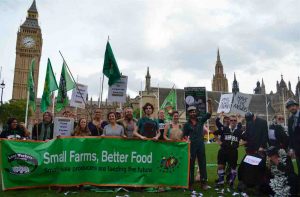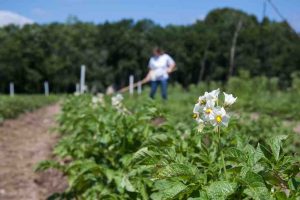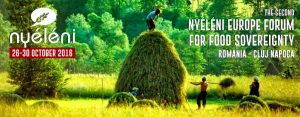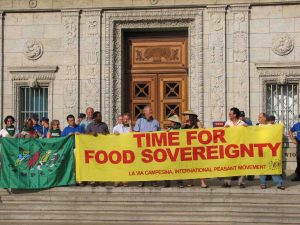Food Sovereignty
This concept appeared in the late 20th century in the so-called ‘Global South’. It emanated from the struggle of peasant farmers faced with – among other things – competition from cheap exports from the hyper-productive, highly subsidised European and American agriculture. They organised themselves and called for food sovereignty: control over their own food system.
In the last decade, however, people working in the food system in the ‘Global North’ have come to realise that food sovereignty was also relevant to them, in the face of the expansion of the agroindustrial model of food production, and increasing corporate control over many aspects of the food system.

The Food Sovereignty Paradigm
Food Sovereignty is first a food paradigm: it presents a way to do food that is fair to people and works with nature. This paradigm informs an alternative policy framework for food and agriculture than the dominating productivist paradigm of the ‘Global North’.
Its six defining principles are that food sovereignty:
- Focuses on food for people: The right to food which is healthy and culturally appropriate is the basic legal demand underpinning food sovereignty. Guaranteeing it requires policies which support diversified food production in each region and country.
- Values food providers: Many smallholder farmers suffer violence, marginalisation and racism from corporate landowners and governments. Agricultural workers can face severe exploitation and even bonded labour. The role and knowledge of women are often ignored, and their rights to resources and as workers violated. Food sovereignty asserts food providers’ right to live and work in dignity.
- Localises food systems: Food must be seen primarily as sustenance for the community and only secondarily as something to be traded. Local and regional provision takes precedence over supplying distant markets. The ‘free trade’ policies which prevent developing countries from protecting their own agriculture are inimical to this paradigm.
- Puts control locally: Local food providers must have control over territory, land, grazing, water, seeds, livestock and fish populations, and their rights are respected. Food sovereignty rejects privatisation of such resources, for example through intellectual property rights regimes or commercial contracts.
- Builds knowledge and skills: Technologies must not undermine food providers’ ability to develop and pass on knowledge and skills needed for localised food systems. Instead, food sovereignty calls for appropriate research systems to support the development of agricultural knowledge and skills.
- Works with nature: Production and distribution systems must protect natural resources and reduce greenhouse gas emissions.
The Food Sovereignty Movement
Food Sovereignty is also a movement: it is a global alliance of farmers, growers, consumers and activists who all work to change the food system for the better. La Via Campesina is one of the leaders of the Food Sovereignty movement. They bring together more than 200 million small and medium-scale farmers, landless people, women farmers, indigenous peoples, migrants and agricultural workers from 70 countries.
The springboard of the global food sovereignty movement was the landmark international Nyéléni 2007 Forum for Food Sovereignty in Mali where 500 representatives from food producer, consumer and environmental movements from around the world came together. At this Forum six principles and the Nyéléni Declaration were adopted.
This was followed by a European Nyéléni Forum in 2011 in Krems, Austria, where the Nyéléni Europe Declaration and an action plan were agreed upon. The UK delegation returned inspired from Krems and the first UK food sovereignty gathering was held in 2012. Out of this came the UK food sovereignty movement and also the Land Workers Alliance. The second UK food sovereignty gathering was held in October 2015. In February 2015 an International Forum for Agroecology was held in the Nyéléni centre in Mali, and produced a report and declaration.
These documents (see links) provide the political basis of the movement, and clarify what it stands for and what it opposes.

The European Food Sovereignty Forum
In autumn 2016 hundreds of people from the entire European continent met in Cluj-Napoca, Romania, for the second Forum of the European Movement for Food Sovereignty!
For 5 days, farmers, fishers, pastoralists, indigenous people, consumers, trade unions, environmental/justice/solidarity/human rights organizations, community-based food movements, journalists, researchers from more than 42 countries brought existing food sovereignty initiatives together, sharing and connecting experiences and planning a pan-European strategy and plan for future food and agriculture.
The key goals of the Forum were
- Share experiences
- Build a common understanding of food sovereignty in Europe
- Develop a Strategy and Action Plan to strengthen and enlarge the food sovereignty movement in Europe
- Influence and advocate for policies that support food sovereignty in Europe
Scotland’s participation
Nourish coordinated a delegation and organised discussion events before and after the Forum for delegates to get input from, and share feedback to, the Scottish food movement.
On 7th October, we held an evening discussion, jointly with Common Good Food, where people from across the food system met with the Scottish delegates and discussed the specific Scottish context of Food Sovereignty.
After their return from the Forum, some of our delegates also took to their keyboards to share their impressions.
- Chelsea from Scotland the Bread wrote ‘Nyéléni Europe Forum on Food Sovereignty‘
- Evie from Leith Crops in Pots wrote this great blog
- Reuben from Glasgow Locavore shared a few pictures
- Elly from from Jack Kane Community Centre wrote ‘Food Justice: What is the work to be done?‘
- Fergus from Common Good Food wrote about ‘Sovereignty, Justice, and the Commons‘
On 10th November, our ‘Scotland’s journey to Food Sovereignty: the next steps‘ gathered people from across Scotland who joined us to hear from the delegates about their experiences at the Forum and to use that momentum to discuss the next steps we must take to make the case for Food Sovereignty in Scotland.

